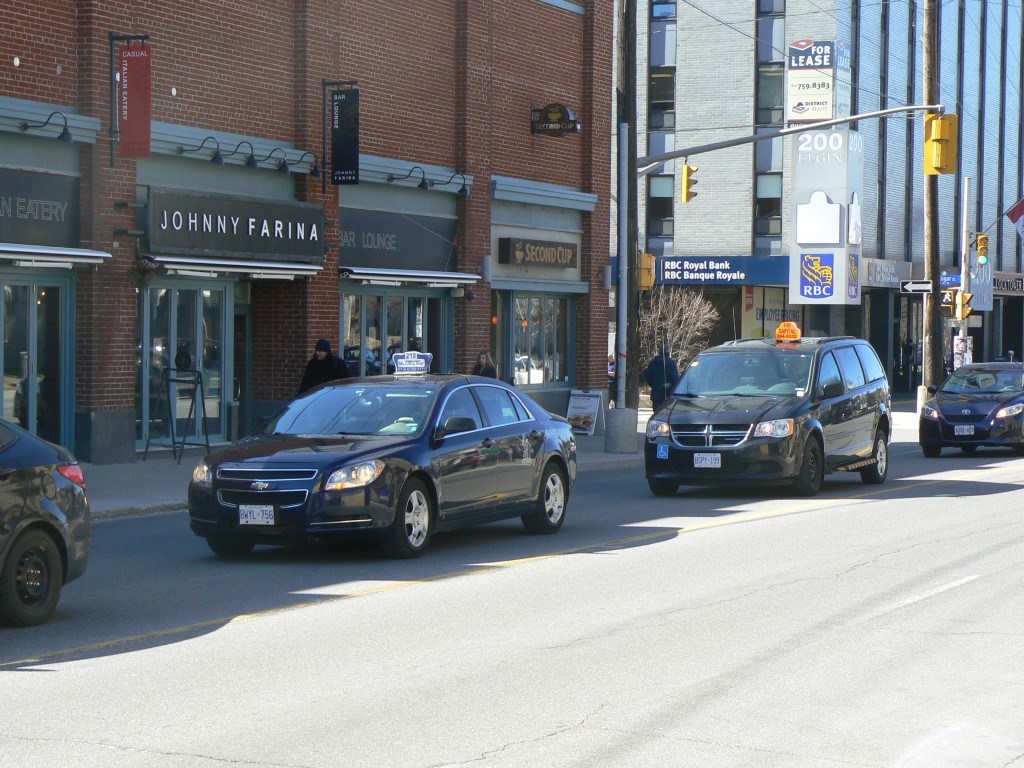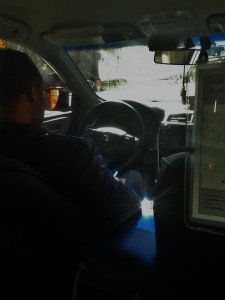Ottawa considers legalizing Uber: Taxi industry not happy
Ottawa City Council is considering legalizing the ride-hailing service Uber. The company began signing on drivers locally in 2015 and sparked protest from taxi cab companies, drivers, and their union. There are four major cab companies in Ottawa. Blue Line, Capital, Westway, and Coventry Connections. All of their drivers are members of Unifor Local 1699.

Blue Line (front) and Capital (back) taxi cabs head south on Elgin Street in downtown Ottawa. Both are facing stiff competition from Uber. Photo by James Morgan
On April 1, city staff issued a report containing recommendations to change the city’s taxi laws, which would not only regulate Uber, but change the rules cab companies and drivers currently have to follow. The big change for taxi users includes ending the $1.50 service charge cab users have to pay if they are paying their fares by credit or debit. For cab companies and drivers, the city taxi license fee would drop by 40 percent and be eliminated totally for cabs that are accessible for customers with limited mobility. Cab drivers will no longer have to take a taxi driving course at Algonquin College (the local community college). Right now, taxi drivers have to carry $2 million in liability insurance. Under the new law, it will be $5 million, and Uber drivers will also be required to carry the same amount on their vehicles. The only vehicle insurance Uber drivers have now is the compulsory minimum for a personal vehicle under Ontario law. The changes will also make it easier for cab passengers to book a ride through an online app, which is how Uber already gets all of its business.
Uber drivers use their own personal vehicles and basically operate as independent concessionaires for the company. It’s like owning a franchise for a store or restaurant, only it’s a car taking people places. Uber drivers are usually part-time people who also have regular jobs. They give rides to make extra cash. Uber is a great example of what is being called the sharing economy, right along with services like Air BnB and couch surfing. Are these things an example of creative entrepreneurship or are they indicators of an economy where workers don’t earn enough and need to rent out their homes and cars to get by? Does the sharing economy help people earn money or does it kill jobs in traditional industries like taxi cabs and hotels? The Uber website says more drivers are wanted, including in Ottawa.
I wanted to find out what a cab driver really thinks of Uber, so I hailed a Westway cab in front of the Hudson’s Bay store on Rideau Street. I’d decided on just a short ride, quick enough to get the questions, answers, and photos without breaking the bank and looking too suspicious. “Elgin and Somerset,” I told the driver. The destination for my surreptitious mission would be coffee at a favorite café of mine with a very Ottawa-appropriate name—The Ministry of Coffee. I snapped a couple of photos on my phone, acting like I was texting or taking a selfie—the latter of which I almost never do. I didn’t ask for the driver’s name and kept his face out of full view in order to protect his identity. He’s just an ordinary guy trying to earn a living after all. As he turned left by the National War Memorial I said; “So, how’s Uber affecting things? Has it hurt business much?” The driver said, “Big time.” I could tell I had a man of few words driving me through downtown Ottawa. I noticed the display on the electronic dispatch device showing a message urging drivers to sign a petition and contact city councillors in protest of Uber legalization. As the cab crossed Laurier Avenue by the courthouse, I asked: “Why do you suppose people use Uber?” “Well, it’s cheaper,” said the driver. “But it’s bad for guys like you,” I said. The driver responded,“Yeah, it’s somebody with a part-time job taking away a full-time job.” We reached the corner of Elgin and Somerset Streets, I handed him a $20 bill, he gave me $10 in change, and out I got and walked over to the Ministry of Coffee.
The short cab ride I took, according to an Uber fare calculator, would have cost me only $5.00, if I’d used the service instead. There’s no cab company with licensing fees and higher insurance rates to cover, and the driver doesn’t have to pay union dues. Many Ottawa taxi drivers are immigrants, and are often well-educated people too. Unfortunately their professional credentials aren’t recognized in Canada so they end up taking less skilled jobs like driving a cab. They see Uber as a major threat to their livelihood. The one sure thing is that the taxi cab business in Ottawa, and cities across North America is in for big changes with long-lasting consequences.
Tags: ottawa, sharing economy, taxi, Uber








